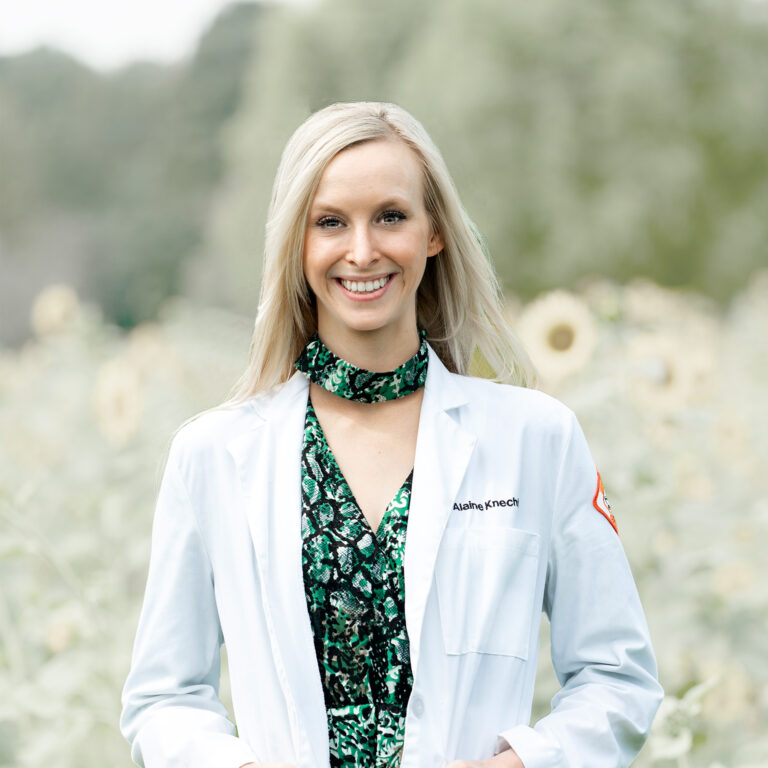2020 Winners

Education
Bachelor of Science in Biology from Louisiana State University in Baton Rouge, Louisiana, Doctor of Pharmacy from University of Tennessee College of Pharmacy in Nashville, Tennessee
Resume
- 6 months residency and 1 year, 4 months as a staff pharmacist at Ochsner main campus in New Orleans
- 7 months as a home infusion pharmacist
- 3 months as a staff pharmacist at CVS
Years in pharmacy
Praise from customers
“She has been very helpful and informative any time I have ever had a question about anything.”
“Alaine has been creating pharmacy poetry for many years now. Her drug poetry is beneficial for both patients and pharmacists to help them understand medications and remember key points related to dosing, duration and potential adverse reactions.”
“She has a heart that truly wants to help anyone in need, working incredibly hard to assist without asking for anything in return. As a pharmacist, with her skills along with her passion and empathy, she will drive pharmacy into a new generation where pharmacists truly help not only each other but every patient that she encounters.”
“Alaine is not only an incredible pharmacist, she also writes amazing drug poems that help people from all backgrounds understand their medications. She recently wrote a drug poem on Hydroxychloroquine that really helps break down its important side effects, which has been a real help for everyone being put on this drug for COVID-19.”
“Dr. Knecht makes pharmacy fun. She creates innovative and catchy poems and raps about drug names and their use. She brings creativity to what can be a sometimes dry and complex profession!”
Notable achievements
- Ex officio of the Tennessee Society of Student Pharmacists
- Member of American Society of Hospital Pharmacists (ASHP)
- Member of American Pharmacist’s Association (APHA)
- Non-resident member of the Tennessee Pharmacist’s Association
Why did you become a pharmacist?
I was always that friend who was worried about drug interactions—reminding everyone that alcohol and Tylenol don’t mix—and I loved chemistry. I knew I wanted to be involved in health care but wanted a balance between work and life. Then, I met two of my parents’ friends who were pharmacists. One owned an independent pharmacy, and the other worked in the hospital. I really liked those two career paths. The more that I talked to them, the more that I realized there were all of these specialties within pharmacy that I could explore if I wanted. That’s what gave me the push into pharmacy school, the variety of roles that pharmacists can have throughout their careers.
I like to keep the golden rule in mind: Treat others the way you want to be treated.
What does a day at work look like for you?
There’s no average day. It really varies, depending on which patients walk through the door. For example, one day a patient walked in who needed to go to the ER for an EKG. My entire day changed because of that one interaction. The last time I talked to her she was thanking me for convincing her to go because they had to do a test to rule out something that could be pretty serious.
I don’t view people at the pharmacy as customers, I view them all as patients. I’m not the kind of person who is okay with just doing the minimum and being done—that’s not how I operate in any part of my life. I hope that comes through in every interaction I have. I like to keep the golden rule in mind: Treat others the way you want to be treated. I also like to imagine that I’m related somehow to every patient. I keep that perspective in mind, and I’ve told patients, “If you were my mother, dad, or grandparent, this is what I would want for you, and this is why I’m telling you this.”
You were nominated by patients for your poetry about medications. How did get started with that?
My dad was always freestyling and speaking in rhymes at home. He fostered my natural creativity. I wrote my first poem at age 5, and had two poems published in A Treasury of American Poetry by the time I was 13. I’ve always written poetry to get through difficult times.
I wrote my first poem about amiodarone, a prescription that treats irregular heartbeat, when I was feeling burnt out from all the studying in pharmacy school. Since then, I’ve written about seizures, alteplase (a drug that treats a specific kind of stroke), and hydroxychloroquine. Sharing those drug poems with other pharmacy professionals and patients on Instagram (and in person) is something that I’m really proud of because it allows me to open up to people, to blend my professional life and my personal life, but in a balanced way. My hope is that it makes difficult medication details a little easier to remember and understand, in a fun way.
What’s the most rewarding part of your job?
It’s being able to make a difference in my patients’ lives. Because of my background in a hospital setting, I still have my two hats on: the hospital world and the community pharmacy world. I look at things like: Did the patient just come out of the hospital? Why are we using this drug? Are they on this drug because of a side effect from another one? I try to take the time to look at those kinds of things, and to have conversations with my patients as much as I can.
My job is to make sure that a medication doesn’t harm a patient. Pharmacists are the drug experts. We’re the last line of defense for patients, to make sure that they don’t get prescribed something that’s going to have an interaction or cause a huge problem for them.
That’s why I really like working for CVS because I can talk to my patients. There have been people who have already thanked me for counseling them. It’s funny because I just consider it part of my job. If it’s important, and I’m concerned about something, or something looks like a red flag, I don’t want that person leaving the pharmacy without having a conversation with me to make sure it’s safe.
What should customers know to save money?
The best person to help is a pharmacy technician. Pharmacists know a lot, but technicians know the most about saving money and insurance. I don’t think technicians get enough recognition. I could not run a pharmacy without them.
It’s also important to have an open, honest conversation with your healthcare provider. Physicians don’t always know how much something costs, but if you share your concerns, they can work with you to find a lower price medication.
What’s your favorite moment as a pharmacist?
It was when I was a fourth year pharmacy student at the VA doing an advanced heart failure rotation. I had one patient who I had to educate about his cardiac health, and he kept trying to avoid me. He pretended to be sleeping, he hid in the bathroom—then I realized he couldn’t hear the video I was supposed to play for him.
I described everything that was happening in it, and all of a sudden we had this “aha! moment.” He realized that salt was a problem for him, not sugar. He didn’t have a good understanding of heart failure, the lifestyle changes that could make a difference, and how these medications could really prolong his life.
He became really motivated after our conversation. I ran into him five or six months later. He had just had a heart procedure that he didn’t qualify for until he actually started taking the prescription he was supposed to. He introduced me to his son, and his son said, “Oh my gosh, so you’re the student who saved my dad’s life?”
That will forever stand out to me. It was one of those moments where I realized just how much of an impact you can really have. You don’t always get to hear that. It was a very humbling moment. It just took one person to get through to this patient—and I’m not going to be that person every time, but if I can be that person one time or two times in my career, then it all feels worth it.
Praise from customers
“She has been very helpful and informative any time I have ever had a question about anything.”
“Alaine has been creating pharmacy poetry for many years now. Her drug poetry is beneficial for both patients and pharmacists to help them understand medications and remember key points related to dosing, duration and potential adverse reactions.”
“She has a heart that truly wants to help anyone in need, working incredibly hard to assist without asking for anything in return. As a pharmacist, with her skills along with her passion and empathy, she will drive pharmacy into a new generation where pharmacists truly help not only each other but every patient that she encounters.”
“Alaine is not only an incredible pharmacist, she also writes amazing drug poems that help people from all backgrounds understand their medications. She recently wrote a drug poem on Hydroxychloroquine that really helps break down its important side effects, which has been a real help for everyone being put on this drug for COVID-19.”
“Dr. Knecht makes pharmacy fun. She creates innovative and catchy poems and raps about drug names and their use. She brings creativity to what can be a sometimes dry and complex profession!”
Notable achievements
- Ex officio of the Tennessee Society of Student Pharmacists
- Member of American Society of Hospital Pharmacists (ASHP)
- Member of American Pharmacist’s Association (APHA)
- Non-resident member of the Tennessee Pharmacist’s Association

